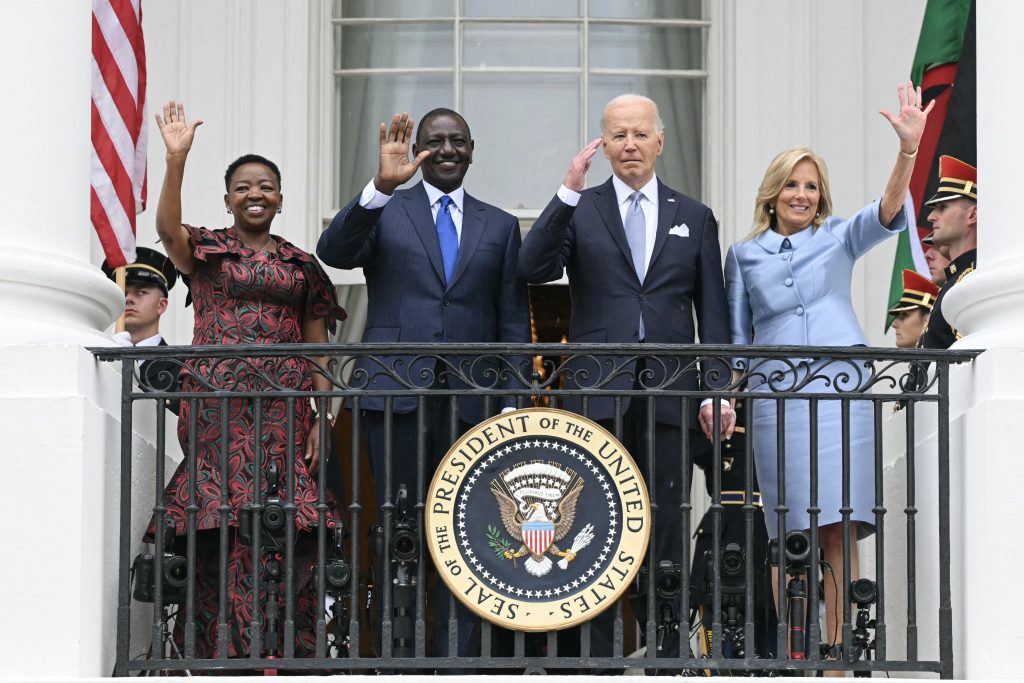
A diplomatic upgrade and a surprise appearance by Barack Obama: US President Joe Biden pulled out the stops as he hosted Kenyan counterpart William Ruto for a lavish state visit aimed at competing with Russia and China for influence in Africa.
At a gala dinner in a large pavilion set up on the White House lawn, Biden praised “the belief in freedom, democracy, dignity and equality” that he shared with Ruto, the first African leader to receive a Washington state visit in 15 years.
Biden matched pomp with a string of deals on security, climate and debt and delivered an Irish-inspired toast in honor of his guest.
“Until we meet again, may God hold you in the palm of his hand,” Biden said.
For his part, Ruto praised the “enduring bonds of friendship, partnership and solidarity between Kenya and the United States.”
Former president Barack Obama, whose father was Kenyan, made a brief surprise appearance at the start of the gala, where 500 guests dined on beef and lobster and enjoyed performances by a gospel choir and country star Brad Paisley.
– ‘A strong and committed friend’ –
Earlier in the day, Biden announced a plan to make Kenya the first major non-NATO ally in sub-Saharan Africa, saying it was the “fulfillment of years of collaboration” against the Islamic State group and Al-Shabaab jihadists in Somalia.
The move will see Kenya join 18 other such allies including Israel, Brazil and Ukraine, boosting military and diplomatic links, although without a formal security pact.
Biden also thanked Kenya for agreeing to lead an upcoming international police mission to Haiti, where months of gang violence have left the tiny Caribbean nation on America’s doorstep in a political and humanitarian crisis.
Ruto said that “in Joe Biden, Kenya and Africa have a strong and committed friend.”
– Back foot –
The Kenyan president’s visit comes as the United States and ally France are on the back foot in Africa, where massive Chinese investments and aggressive use by Russia of shadowy paramilitary groups are changing the geopolitical balance.
Biden and Ruto repeatedly stressed common “democratic values” and their desire to share leadership on issues of climate change, political instability and debt distress.
The two leaders also issued a “joint vision statement” on reducing the mounting debts of developing countries and the handicap it represents for African countries trying to grow their economies.
The 81-year-old US president further welcomed Ruto’s “mutual support” for Ukraine, which is one of the current 18 non-NATO allies and is receiving Western military aid as it battles Russia’s invasion.
– Symbolism –
But as with any state visit to the White House — Biden has hosted the leaders of Japan and Australia in the last eight months alone — the symbolism was as important as the deliverables.
The two leaders posed with US First Lady Jill Biden and Ruto’s wife Rachel on the White House balcony, strolled through the famed colonnades and shook hands ahead of their talks in the Oval Office.
Biden held a major summit for African leaders in 2022, but he has not made good on promises to visit the continent as president.
The Democrat, who faces a tight rematch against Donald Trump in November’s US presidential election, quipped on Wednesday when Ruto arrived that “I plan on going in February after I’m reelected.”
Africa has often been on the back burner for US diplomats but the continent now presents a growing headache in Washington.
Russia has established new footholds — most recently in Niger, where the United States has agreed to withdraw its 1,000 troops, while Russian troops come in.
The United States also faces competition from China, which has pumped billions in infrastructure money into Africa for the past two decades.
Ruto’s White House visit meanwhile represents a major turnaround for the Kenyan, who was previously accused by the International Criminal Court of crimes against humanity over violence after Kenya’s 2007-8 election.
The case was dropped after the prosecutor complained of a campaign of witness intimidation.
bur-dk/md/acb
© Agence France-Presse





